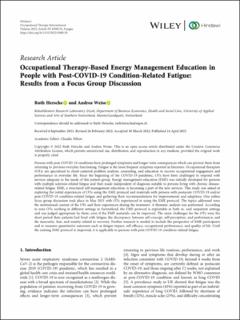Please use this identifier to cite or link to this item:
https://doi.org/10.21256/zhaw-24829Full metadata record
| DC Field | Value | Language |
|---|---|---|
| dc.contributor.author | Hersche, Ruth | - |
| dc.contributor.author | Weise, Andrea | - |
| dc.date.accessioned | 2022-04-21T08:07:34Z | - |
| dc.date.available | 2022-04-21T08:07:34Z | - |
| dc.date.issued | 2022-04 | - |
| dc.identifier.issn | 0966-7903 | de_CH |
| dc.identifier.issn | 1557-0703 | de_CH |
| dc.identifier.uri | https://digitalcollection.zhaw.ch/handle/11475/24829 | - |
| dc.description.abstract | Persons with post-COVID-19 conditions have prolonged symptoms and longer-term consequences which can prevent them from returning to previous everyday functioning. Fatigue is the most frequent symptom reported in literature. Occupational therapists (OTs) are specialized in client-centered problem analysis, counseling, and education to recover occupational engagement and performance in everyday life. Since the beginning of the COVID-19 pandemic, OTs have been challenged to respond with services adequate to the needs of this patient group. Energy management education (EME) was initially developed for persons with multiple sclerosis-related fatigue and then made independent of diagnosis suitable to persons living with chronic disease-related fatigue. EME, a structured self-management education, is becoming a part of the new services. This study was aimed at exploring the initial experiences of OTs using the EME protocol and materials with persons with postacute COVID-19 and/or post-COVID-19 condition-related fatigue and gathering their recommendations for improvements and adaptions. One online focus group discussion took place in May 2021 with OTs experienced in using the EME protocol. The topics addressed were the institutional context of the OTs and their experiences during the treatment. A thematic analysis was performed. According to nine OTs working in different settings in Switzerland, the EME protocol is exploitable in both in- and outpatient settings and was judged appropriate by them, even if the EME materials can be improved. The main challenges for the OTs were the short period their patients had lived with fatigue; the discrepancy between self-concept, self-perception, and performance; and the insecurity, fear, and anxiety related to recovery. Further research is needed to include the perspective of EME participants and to measure quantitative outcomes such as fatigue impact, self-efficacy, occupational performance, and quality of life. Until the existing EME protocol is improved, it is applicable to persons with post-COVID-19 condition-related fatigue. | de_CH |
| dc.language.iso | en | de_CH |
| dc.publisher | Hindawi | de_CH |
| dc.relation.ispartof | Occupational Therapy International | de_CH |
| dc.rights | http://creativecommons.org/licenses/by/4.0/ | de_CH |
| dc.subject | Occupational therapy | de_CH |
| dc.subject | Energy conservation strategies | de_CH |
| dc.subject | Long Covid | de_CH |
| dc.subject | Fatigue | de_CH |
| dc.subject | Fatiguemanagement | de_CH |
| dc.subject | Energiemanagement | de_CH |
| dc.subject.ddc | 615.8515: Ergotherapie | de_CH |
| dc.subject.ddc | 616: Innere Medizin und Krankheiten | de_CH |
| dc.title | Occupational therapy-based energy management education in people with post-COVID-19 condition-related fatigue : results from a focus group discussion | de_CH |
| dc.type | Beitrag in wissenschaftlicher Zeitschrift | de_CH |
| dcterms.type | Text | de_CH |
| zhaw.departement | Gesundheit | de_CH |
| zhaw.organisationalunit | Institut für Ergotherapie (IER) | de_CH |
| dc.identifier.doi | 10.1155/2022/4590154 | de_CH |
| dc.identifier.doi | 10.21256/zhaw-24829 | - |
| zhaw.funding.eu | No | de_CH |
| zhaw.issue | 4590154 | de_CH |
| zhaw.originated.zhaw | Yes | de_CH |
| zhaw.pages.end | 9 | de_CH |
| zhaw.pages.start | 1 | de_CH |
| zhaw.publication.status | publishedVersion | de_CH |
| zhaw.volume | 2022 | de_CH |
| zhaw.publication.review | Peer review (Publikation) | de_CH |
| zhaw.author.additional | No | de_CH |
| zhaw.display.portrait | Yes | de_CH |
| Appears in collections: | Publikationen Gesundheit | |
Files in This Item:
| File | Description | Size | Format | |
|---|---|---|---|---|
| 2022_Hersche-Weise_Energy-Management-Education-Covid19-Fatigue.pdf | 400.86 kB | Adobe PDF |  View/Open |
Show simple item record
Hersche, R., & Weise, A. (2022). Occupational therapy-based energy management education in people with post-COVID-19 condition-related fatigue : results from a focus group discussion. Occupational Therapy International, 2022(4590154), 1–9. https://doi.org/10.1155/2022/4590154
Hersche, R. and Weise, A. (2022) ‘Occupational therapy-based energy management education in people with post-COVID-19 condition-related fatigue : results from a focus group discussion’, Occupational Therapy International, 2022(4590154), pp. 1–9. Available at: https://doi.org/10.1155/2022/4590154.
R. Hersche and A. Weise, “Occupational therapy-based energy management education in people with post-COVID-19 condition-related fatigue : results from a focus group discussion,” Occupational Therapy International, vol. 2022, no. 4590154, pp. 1–9, Apr. 2022, doi: 10.1155/2022/4590154.
HERSCHE, Ruth und Andrea WEISE, 2022. Occupational therapy-based energy management education in people with post-COVID-19 condition-related fatigue : results from a focus group discussion. Occupational Therapy International. April 2022. Bd. 2022, Nr. 4590154, S. 1–9. DOI 10.1155/2022/4590154
Hersche, Ruth, and Andrea Weise. 2022. “Occupational Therapy-Based Energy Management Education in People with Post-COVID-19 Condition-Related Fatigue : Results from a Focus Group Discussion.” Occupational Therapy International 2022 (4590154): 1–9. https://doi.org/10.1155/2022/4590154.
Hersche, Ruth, and Andrea Weise. “Occupational Therapy-Based Energy Management Education in People with Post-COVID-19 Condition-Related Fatigue : Results from a Focus Group Discussion.” Occupational Therapy International, vol. 2022, no. 4590154, Apr. 2022, pp. 1–9, https://doi.org/10.1155/2022/4590154.
Items in DSpace are protected by copyright, with all rights reserved, unless otherwise indicated.